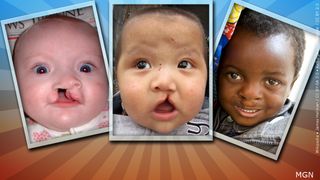BATON ROUGE — Cleft lip and cleft palate affect thousands of babies every year, according to the CDC. But there are ways to reduce risk.
It happens when a baby's lip or mouth doesn't fully form during pregnancy. A cleft lip is an opening in a baby's upper lip and a cleft palate is in the roof of a baby's mouth.
"All of this is happening early on in pregnancy during the first trimester,” Colin Brady, a pediatric facial surgeon at Children's Healthcare of Atlanta, said.
He says the cause of cleft lip and cleft palate aren't fully known, but there are a variety of risk factors including smoking or drinking alcohol during pregnancy, having diabetes before pregnancy, certain medications in the first trimester, obesity and certain infections during pregnancy.
“One thing that we know for certain is that a family history of cleft is certainly a risk for subsequent generations having cleft and cleft lip and palate can often run in a family," Brady said.
To reduce risk, the March of Dimes says folic acid should be taken before and during pregnancy. The organization recommends 400 micrograms every day before pregnancy and 600 micrograms when pregnant.
Before pregnancy, get to a healthy weight and make sure vaccinations are up to date during pregnancy. Additionally don't smoke or drink alcohol, make sure medications are safe and get prenatal care early and often.
“Early findings of this on 3D ultrasonography and some of the newer modalities that we have can at least lend parents an ability to take some time to get their expectations kind of set before the child is born,” Brady said.
